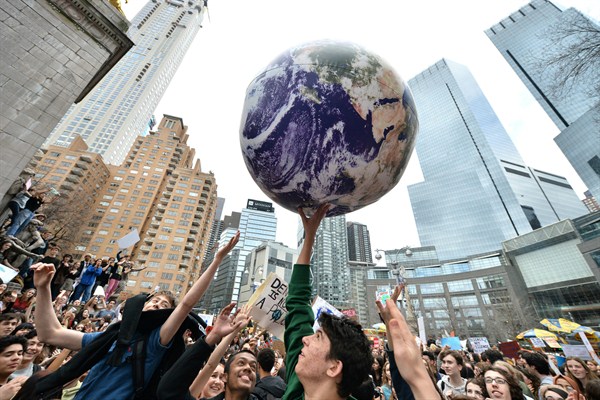The biggest challenge humanity faces this century is ensuring that the march of civilization does not degrade the global environment so much that we irreparably harm the planet on which our own survival depends. The advent of the Anthropocene—a new geological era in which humanity is the most important force shaping the biosphere—has revealed a fundamental contradiction between the Earth’s own integrated natural systems and a hopelessly fragmented international system. The former is an ecological and geophysical whole, as apparent in the famous “Earthrise” photograph taken by Apollo 8 astronauts on Christmas Eve, 1968. The latter is an artificial human construct that arbitrarily divides the planet into 193 mutually exclusive, independent territories.
The question is whether a world so organized—or more accurately, disorganized—can possibly address grave environmental challenges that pay no heed to national borders. The evidence to date suggests that it cannot. The biosphere confronts multiple crises, among them climate change, ecosystem destruction, biodiversity collapse and degradation of the oceans. And yet the presence of so many sovereign players frustrates our ability to respond, as independent actors often resist binding commitments or look to free ride on others’ efforts. In an ecologically interdependent planet, actions taken in one jurisdiction—such as greenhouse gas emissions or the release of toxins—can generate negative cross-border and even planetary spillovers, with little way to hold sovereigns to account.
How to resolve this dilemma? The most logical way is to expand our concept of sovereign responsibility to incorporate environmental stewardship, by adopting the principle that all nations have a duty to protect the integrity of the living planet. This is no idle thought experiment. In the summer of 2019, a row erupted between President Emmanuel Macron of France and his counterpart in Brazil, Jair Bolsonaro, as tens of thousands of fires engulfed the Amazon rainforest, endangering one of the world’s most important carbon sinks, sources of oxygen and repositories of biodiversity. Macron described the fires as “ecocide” and accused the far-right Bolsonaro of “lying” about climate change while opening the rainforest to rampant exploitation by farmers, miners and ranchers. An irate Bolsonaro responded by accusing Macron of treating Brazil “as if we were a colony or a no-man’s land.”

